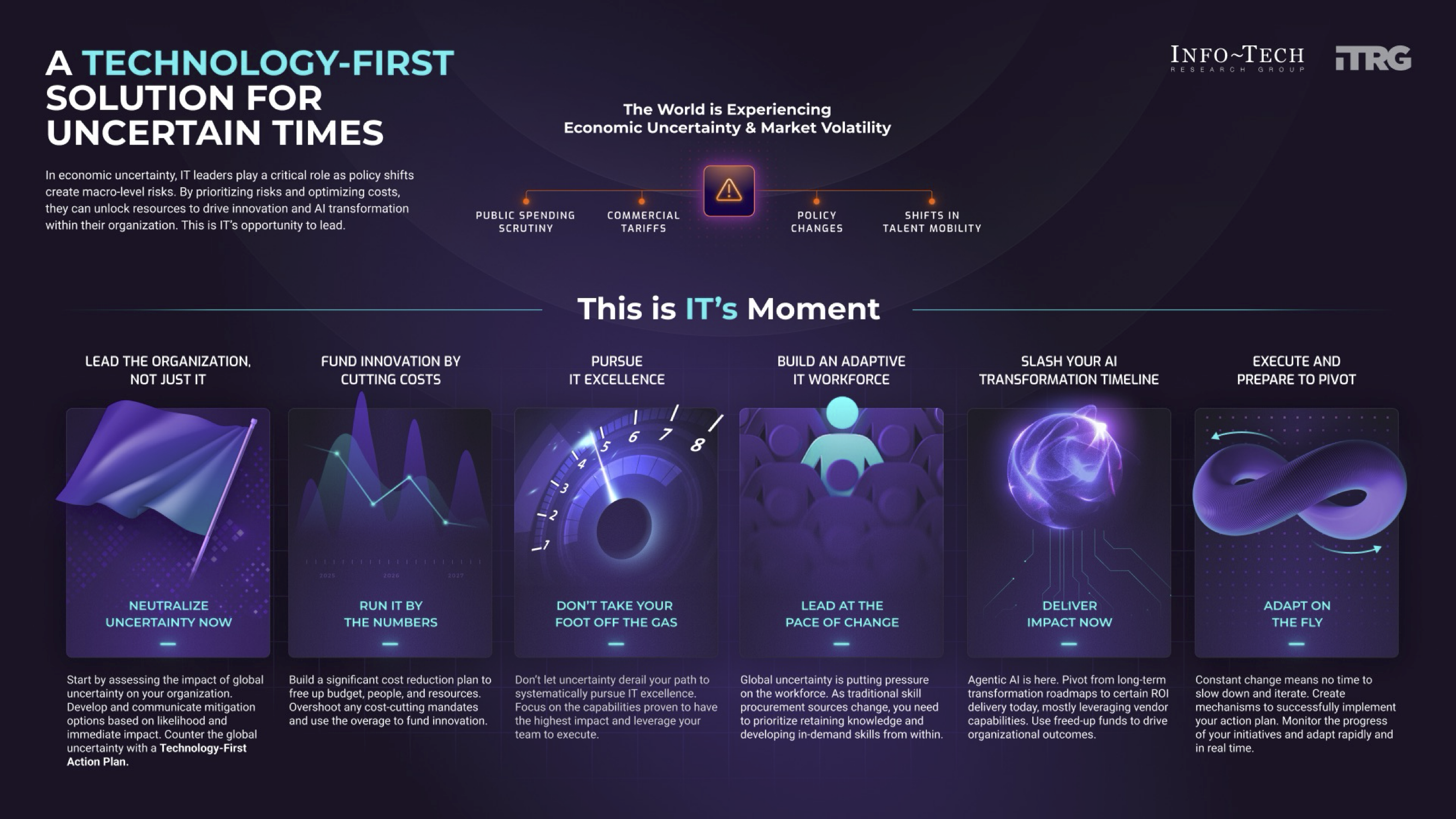When the ripple effects of economic and policy disruption hit, IT is often first on the scene. Amid the volatility of shrinking budgets, escalating tariffs, and persistent supply chain fragility, IT leaders in the retail sector have a unique opportunity to lead a strategic response. Equipped with solutions like hyper-automation, GenAI, and FinOps, they can transform disruption into competitive advantage. Our step-by-step blueprint can help IT leaders in retail build a technology-first action plan that will turn today’s volatility into tomorrow’s value.
To help their organizations remain competitive, IT must take the lead by prioritizing risks, optimizing costs, and investing in technologies that drive smarter, faster retail decisions – whether through AI-powered personalization, intelligent inventory management, or privacy-safe analytics. This is IT’s moment to lead – enabling technology as a strategic hedge against uncertainty and a catalyst for retail resilience.
1. Cut costs to free up resources for innovation.
Innovation drives new ways of generating organizational value but often sees its budget slashed amid budget constraints. IT leaders must cut unnecessary costs and redirect spending to the people, resources, and budgetary capacity their innovation efforts will need to overcome today’s turmoil.
2. Meet the moment. Take the lead.
As much as today’s uncertainty is a strain on IT’s resources, it can also be an opportunity. By demonstrating that their technological know-how can be used not only to solve problems but also to enable better decision-making, CIOs can prove their ability to lead not just IT, but the organization as a whole.
3. 91��Ƭ�� an adaptive IT team.
With technology advancing at an exponential rate, you will never permanently close the skills gap. Focus instead on building sustainable learning and development practices to enable your staff to retain knowledge and develop in-demand skills as they are needed.
Use this step-by-step blueprint to realign IT to lead through retail uncertainty
Our research offers practical guidance with a step-by-step framework to build a technology-first action plan capable of adapting IT to any technological challenge.
- Assess uncertainties and opportunities by scanning your IT environment for vulnerabilities and determining, assessing, and prioritizing new IT risks.
- Review IT staff and spending to find costs that can be either cut or channeled toward innovation opportunities.
- 91��Ƭ�� your technology-first action plan by identifying and prioritizing initiatives that will drive the organization forward and consolidate each into a 12-month plan.
- Prepare to execute by identifying the organizational value of your plan and building an adjustable communications strategy to bring stakeholders on board.
Adapt to Uncertainty With a Technology-First Action Plan for Retail
Cost cutting in times of crisis works; doubling down on innovation works even better.
Analyst perspective
Cost cutting in times of crisis works; doubling down on innovation works even better.

CIOs are the strategic bridge between business needs and technology delivery, who ensure that innovation serves both operational efficiency and customer impact. When economic shifts or policy changes begin to disrupt sales, CIOs are often the first to detect the ripple effects, whether through slowing transaction volumes, changing customer behavior, or supply chain strain. Their end-to-end visibility enables early intervention.
Retail CIOs now have the tools to counter disruption before it hits the bottom line. Hyperautomation streamlines store operations and compliance tasks. Gen AI copilots help fill merchandising, service, and planning skill gaps. FinOps disciplines control cloud costs when supplier prices spike. And privacy-safe analytics ensure retailers stay compliant while still extracting insight from customer data. By acting now, CIOs can frame technology investments as a strategic hedge against uncertainty – delivering agility and value before cost-cutting becomes the only option. In a volatile market, digital leadership isn’t just helpful – it’s retail’s most reliable defense.
91��Ƭ�� a technology-first action plan for retail that can turn today’s volatility into tomorrow’s value.
Donnafay MacDonald
91��Ƭ�� Director, Industry 91��Ƭ��
91��Ƭ��
Please note: This research was developed with the assistance of generative AI. For information about how, please see in the Appendix
Executive summary
Your challenge
In 2025, organizations faced a series of unexpected macro-vulnerabilities that drastically impacted how they functioned
Global Supply Chain Disruption
With over 98% of US apparel sourced internationally (US Import Data , 2024), tariff shocks are exposing the fragility of cost-optimized supply chains. As tariffs inflate input costs, retailers face margin pressure and pricing dilemmas across imported categories.
Operational and Compliance Rigidity
Frequent and unpredictable trade policy shifts require more than reactive compliance and they demand enterprise-wide planning agility. Retailers must respond to uncertainty with strategic adaptability across systems and teams.
Planning Uncertainty & Decision Latency
Tariff-driven cost increases lead to price hikes or reduced product availability, creating friction with price-sensitive consumers. This can shift demand toward private labels, substitutes, or competitors not affected by the same duties.
Executive summary
Common obstacles
For CIOs and IT leaders, these vulnerabilities present challenges to achieving their technology mandates
Sourcing Flexibility Under Fire
80% of supply chains are experiencing shortages, and only 8% of companies have contingency plans (PYMNTS, 2025). Most retailers lack the systems to enable real-time cost modeling or flexible sourcing, limiting their ability to shift vendors or negotiate in response to tariff hikes.
Technology Fragmentation
Outdated processes mean 74% of companies are leaving money on the table (Globality, 2023), while organizations operating in real time are 17% better at managing risk (MIT Center for Information Systems 91��Ƭ��, 2024). The takeaway? Composable, real-time tech stacks are no longer optional; without them, retailers can’t move fast enough to protect profits or maintain customer trust when costs surge.
CIO-Led Automation
41% of retailers lack the skills to adopt AI/ML (Fluent Commerce, 2024), yet one global retailer cut supplier costs by up to 3%, closing 68% of deals via chatbot (HBR, 2022). To stay competitive, CIOs must scale automation with real-time data and composable tech to drive speed and agility.
Executive summary
Resolution
Explore the entire suite of research that supports these pillars by visiting our research center IT’s Moment: A Technology-First Solution for Uncertain Times.
-
Lead the Organization, Not Just IT
Neutralize Uncertainty Now -
Fund Innovation by Cutting Costs
Run IT by the Numbers -
Pursue IT Excellence
Don’t Take Your Foot off the Gas -
91��Ƭ�� an Adaptive IT Workforce
Lead at the Pace of Change -
Slash Your AI Transformation Timeline
Deliver Impact Now -
Execute and Prepare to Pivot
Adapt on the Fly
Info-Tech’s Approach
- Phase 1 – Assess Uncertainties and Opportunities
- Phase 2 – Review Budget, Staffing, and Contracts
- Phase 3 – 91��Ƭ�� Your Technology-First Action Plan
- Phase 4 – Get Ready to Execute!

1: Lead the Organization, Not Just IT
Neutralize Uncertainty Now
- Defuse Uncertainty Drivers: Understand organizational impact.
- Lean Into the Curve: Apply Exponential IT.
- Pick Your First Bets: Deliver use cases now.
- Claim Your New Mandate: Technology-first or go out of business.
- Get the Word Out: Tell the entire organization now.
Start by assessing the impact of global uncertainty on your organization. Develop and communicate mitigation options based on likelihood and immediate impact. Counter the global uncertainty with a technology-first action plan.
2: Fund Innovation by Cutting Costs
Run IT by the Numbers
- Don’t Bet the Farm: Set the innovation budget.
- Find Real Dollars Quickly: Cut costs now.
- Demonstrate Technology Impact: Benchmark spend and shift.
- Shorten the Cycles: 91��Ƭ�� a flexible budget (finally).
- Sharpen the Pencil: Renegotiate vendor contracts.
91��Ƭ�� a significant cost reduction plan to free up budget, people, and resources. Overshoot any cost-cutting mandates and use the overage to fund innovation.
20%
Only 20% of CFOs are happy with the impact tech investments make on their business (Remini Street, 2024).
3: Pursue IT Excellence
Don’t Take Your Foot off the Gas
- Get the Baseline: Understand your maturity.
- Focus on What Really Matters: Improve your critical capabilities.
- You Can’t Do IT Alone: Guide your team.
- Enable Everyone: Provide tools and training.
- Aim High Selectively: Leapfrog for impact.
Don’t let uncertainty derail your path to systematically pursue IT excellence. Focus on the capabilities proven to have the highest impact and leverage your team to execute.
85%
85% of core processes are ineffective on average across all IT organizations (Info-Tech IT Management & Governance Diagnostic, 2024).
4: 91��Ƭ�� an Adaptive IT Workforce
Lead at the Pace of Change
- Knowledge Is Power: Stop the drain.
- Drive Adaptability: Be it and teach it.
- Lead the Pack: Autonomize aggressively.
- Fill Your Gaps: 91��Ƭ�� critical skills.
- Win the Race for Talent: Money isn’t everything.
Global uncertainty is putting pressure on the workforce. As traditional skill procurement sources change, you need to prioritize retaining knowledge and developing in-demand skills from within.
IT positions that are going unfilled are costing organizations in the United States an average of $187 billion in lost revenue each year (CompTIA, 2024).
